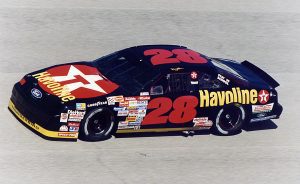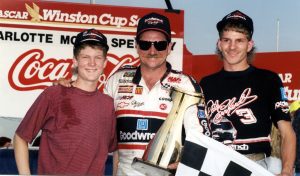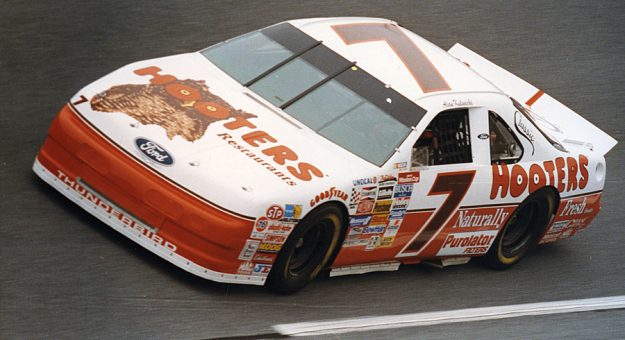Editor’s Note: NASCAR is celebrating its 75th anniversary in 2023. SPEED SPORT was founded in 1934 and was already on its way to becoming America’s Motorsports Authority when NASCAR was formed. As a result, we will bring you Part 45 of a 75-part series on the history of NASCAR as told in the pages of National Speed Sport News and SPEED SPORT Magazine.
The usual suspects in the hunt for the 1992 NASCAR Winston Cup championship — five-time and defending champion Dale Earnhardt, Rusty Wallace, Bill Elliott and Mark Martin — all shared one thing in common.
In addition to being talented drivers, each was part of a team owned and run by another.
Earnhardt drove for former driver Richard Childress, Wallace’s car was owned by Roger Penske, Elliott was in his first season driving for Junior Johnson and Martin was going for his first title in a Ford Thunderbird belonging to Jack Roush.
However, in a season marked by Richard Petty’s retirement and the passing of Big Bill France, one owner/driver did what no one had done since Petty won his seventh title in 1979: drive an independent operation to the championship.
Davey Allison won the Daytona 500. Elliott dominated the next event at North Carolina Motor Speedway. Allison was second, but 13 seconds behind as Elliott averaged a record 126.125 mph in his first victory behind the wheel of Junior Johnson’s No. 11 Ford.
“I told Bill last year when we first talked that if he’d come over with us, we’d make sure he had the equipment and stuff and all he’d have to do is drive,” said Johnson. “We’d take care of the rest of it.”
The Johnson crew took care of business the following Sunday as Elliott led 348 of the 400 laps and held off Alan Kulwicki in a door-to-door finish at Richmond (Va.) Raceway. It was the seventh straight race a Ford had visited victory lane.
Elliott brought Ford’s streak to eight with his third consecutive victory at Atlanta. In one of the more fortuitous triumphs of his career, Elliott inherited the top spot on lap 285 after the eight cars in front of him pitted at the same time under yellow. He led the final 43 laps.
The red-and-white No. 11 Thunderbird was in victory lane again at Darlington Raceway. Runner-up Harry Gant narrowed Elliott’s advantage to 1.5 seconds, but could get no closer as became the fourth driver in NASCAR’s modern era to win four consecutive races.
“We won four straight with Cale (Yarborough) and four straight with Darrell (Waltrip),” said an elated Johnson. “Harry did it last fall and now we’ve done it again. It’s just a storybook deal.”
Only Ford’s streak remained intact after the Food City 500 at Bristol (Tenn.) Motor Speedway.
Owner/driver Kulwicki won from the pole, and as importantly, enjoyed a big payday for his team. His $83,360 check included a $22,800 Unocal bonus for winning from the pole. Also, Ford added a $5,000 bonus for the pole position and $50,000 more for winning the race.
Kulwicki was now in NASCAR’s Winner’s Circle Program, which would pay him an additional $200,000 if he started each of the remaining races on the schedule.
Ford’s 11th straight victory was credited to Allison at North Wilkesboro (N.C.) Speedway. Allison beat Pontiac driver Wallace to the stripe despite torn rib cartilage and a sore shoulder from an accident at Bristol. The victory, Allison’s 15th of his career, extended his point lead to 86 over Gant.
Allison won again in the Winston 500 at Talladega (Ala.) Superspeedway. In the race, Ford drivers Allison and Elliott worked together to hold off a contingent of their Chevrolet rivals led by Earnhardt. Ford’s streak was now at 13.
“I knew the Chevrolets weren’t going to go where the Fords went,” said Allison after the race. “I was staying low in the draft to help Bill beat those Chevys, as long as he finished behind me.”

The next blow in the auto manufacturer’s battle for supremacy came from Chevrolet. Twenty-year-old Busch Grand National driver Jeff Gordon defected to Chevrolet when he signed a 4-year, $2.6 million deal to drive for Hendrick Motorsports.
“We put him in Grand National, we invested a lot of money, made sure he got the right people and everything,” vented Michael Kranefuss, Ford’s Director of Special Vehicle Operations. “So why would he all of a sudden treat us like this?”
Herb Fishel, director of the General Motors Motorsports Technology Group, took a grander view of the latest manufacturer spat. “GM has been in a shooting war with Ford for so many years, no one even remembers who fired the first shot,” he said.
Allison then won the non-points race, The Winston, at Charlotte Motor Speedway, but was injured in the process. As Allison crossed the finish line, he and runner-up Kyle Petty came together, sending Allison hard into the wall, driver’s side first. Allison suffered a concussion, bruised lung and contusions on his legs, but returned the following week.
The Coca-Cola 600 was where the Ford string stopped. After 13 consecutive victories, Lumina driver Earnhardt used a 19.4-second pit stop to vault from third to first over Ernie Irvan and Petty, who formed a three-car non-Ford train to the checkers.
The Budweiser 500 followed a week later and Harry Gant did it again. The 52-year-old bested his own record as oldest Winston Cup victor with the trophy at Dover Downs Int’l Speedway. Irvan earned his first victory of the year on June 7 at Sonoma (Calif.) Raceway. He was penalized for jumping the start and fell to the rear of the 43-car field.
Yet, 67 laps later, he took the lead and held on to the finish.
William H. G. (Bill) France died Sunday, June 7.
The former driver and mechanic founded NASCAR to bring order to the chaos which ruled racing in the 1940s. His vision built the largest race sanctioning body in the world and made a household name out of such men as Petty, David Pearson and Cale Yarborough.
Kulwicki won at Pocono Raceway before Allison ended a mini-slump with a victory at Michigan Int I Speedway. lrvan won again in the Pepsi 400 at Daytona, but Allison was the man to beat at the halfway point of the 1992 season.
The Winston Cup show returned to Pocono on July 19 and Allison dominated the first 150 laps. However, as he and Waltrip dueled for the lead coming out of the first turn on the 150th lap, Allison’s Thunderbird lifted into the air, flipped and rolled along the apron coming to rest on the infield.
“We touched very lightly, but he was turning left and it was enough to turn him around,” said Waltrip, the eventual winner. “I didn’t know what had happened until we came around and I saw it (Allison’s No. 28 Texaco Ford) and got sick to my stomach.”
The point leader broke the two bones in his right forearm, his right collarbone and suffered a contusion over his left eye. The next Sunday he completed the first lap at Talladega (Ala.) Super Talladega before relief driver Bobby Hillin drove the No. 28 car to a third-place finish. lrvan won for the third time on the season at the superspeedway race.
Kyle Petty triumphed at Watkins Glen (N.Y.) Int’l before Waltrip won consecutive races at Bristol and Darlington. The Southern 500 victory was Waltrip’s 84th Cup Series triumph.
Wallace broke his 34-race losing streak at Richmond, Ricky Rudd triumphed at Dover, Geoff Bodine earned the Martinsville victory and Martin was back in victory lane at Charlotte. With three races remaining, five drivers sat within 114 points of point leader Elliott.
Allison was closest, followed by Kulwicki, Martin, Gant and Kyle Petty.

Petty won at Rockingham, but Allison retook the point lead after winning the penultimate race of the season at Phoenix Raceway. Kulwicki was third and trailed Allison by 30 points, with Elliott another 10 points behind entering the finale at Atlanta Motor Speedway.
Allison had trouble and dropped out of the event while Elliott took the victory with Kulwicki edging Elliott by a mere 10 points to win the championship. Kulwicki, who came South to pursue his dream of being a Cup Series owner and driver after graduating from the University of Wisconsin, reflected on his journey to the title.
“I turned down some good rides and I’ve tried to keep a low-key attitude and keep my nose clean, and I’ve had to stand hard and fast to my decisions. Dad didn’t want me to get into racing at the start,” Kulwicki continued. “There were times I wanted him to help me, but in the long run, him staying out of it helped me more. I had to do it on my own.”
Kulwicki’s championship as an owner/driver was a tribute not only to him, but also to the last owner/driver to win the championship. Richard Petty took the checkered flag for the last time as a driver in the Hooters 500. A special post-race turn around the speedway, culminating with flagman Doyle Ford waving the victory flag over The King, ended his career.
Petty’s first of 200 victories came on Feb. 28, 1960 at Charlotte Fairgrounds. His last was the Firecracker 400 on July 4, 1984. In between, he earned seven titles and, along with A.J. Foyt, became the biggest name in motorsports.
Petty commented on his final race in the Nov. 18 NSSN: “My daughters came in after the race and were crying and (wife) Lynda was crying, and it made me feel good about quitting. It really took a load off me in the sense that I saw through them how glad they were it was all over with,” he said.
Elliott was the Most Popular Driver and Jimmy Hensley earned rookie-of-the year honors. Other NASCAR division winners in 1992 included Joe Nemechek in Busch Grand National and Dick McCabe in BGN North. Jeff Fuller won the Winston Modified Tour, while Jody Ridley took the Winston All Pro title.
Mickey York was the Goody’s Dash Series champion after 17 years on the circuit. Bill Sedgewick won the Winston West title and Ron Hornaday Jr. was the Featherlite Southwest Tour champion.
